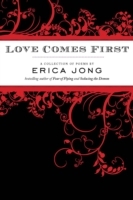Love Comes First is Erica Jong's long-awaited return to her poetic roots! Here is Erica Jong's first book of all-new poems in more than a decade. Known and beloved for Fear of Flying and her many other books of fiction, nonfiction and poetry, Jong expounds on the most eternal, universal topic of all: love. Using brilliant imagery and intense metaphorical insights to paint vivid pictures of love, and all that comes with it-the heights of elation, the depths of sorrow-she covers every inch of the spectrum with her vibrant and insightful words. Perfect for wedding showers, lovers of all ages, and Valentine's Day, Jong's trademark trailblazing style and remarkable ability to bridge the gap between literary and popular poetry makes Love Comes First an instant classic. Discover- or discover yet again-the brilliance of Erica Jong.
Watch the trailer for this book:

